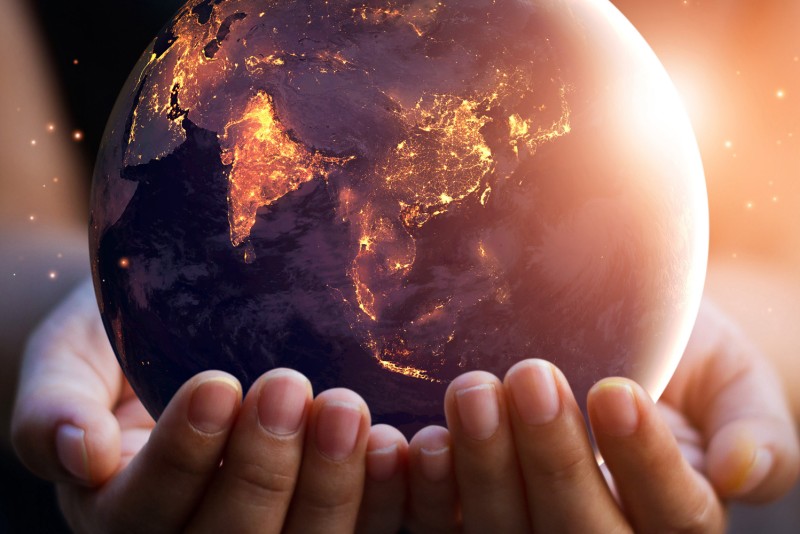Nurture Your Eco-Resilience Through the Wholeness of Nature
We like to think of nature as a place for recreation, relaxation, and restoration. A meandering trail for hiking and birdwatching or a roaming river for swimming and fishing. A lush park lawn or a vast beach for a picnic with loved ones. The awe-inspiring vista at a retreat center to foster self-reflection and healing.
However, the state of nature on our planet is changing. Science shows that our earth is in the midst of a sixth mass extinction, as human activities drive the rapid decline of 1 million animal and plant species. The news tells of our leaders’ struggles to limit carbon emissions as global temperatures rise. Social media broadcasts heartbreaking stories of communities worldwide suffering through the latest megafire, flood, drought, or hurricane.
With all this destruction, how can we relax in nature, let alone protect it? It’s easy to feel overwhelmed.
Personally, I feel the prickle of these emotions almost every day. In my work as a wildlife conservationist, I witness animals in distress as we deforest their homelands and kill or kidnap their family members. I’ll come across a turtle hit by a motorist, or hear about a tiger trapped by poachers, or read of an entire bird species declared extinct. Each time, the news translates from my mind to my body as raw and visceral sensation: breath shortening, chest tightening, stomach constricting, hands trembling, nausea rising. And of course, inevitably, these feelings are narrated by a crazed tumble of negative thoughts, paired with a flash of paralyzing hopelessness.
Hello, Eco-Anxiety
You and I are not alone in these feelings; in fact, we’re in good company. These days, so many people despair about the state of the environment that in 2017, the American Psychiatric Association gave this experience a name: eco-anxiety.
This feeling of grief about the planet is pervasive and on the rise. Sixty-eight percent of people surveyed in 2020 felt that climate change is affecting their mental health, an increase of 21% from the year before.1
It’s healthy to feel concerned about the environment and inspired to take action. But when feelings of eco-anxiety remain all-consuming over time, they can become unmanageable, leading to depression, burnout, and other debilitating conditions.
My own unchecked eco-anxiety convinced my mind that my 5-year effort to help conserve tigers and leopards in an Indian national park was futile. I spiraled into anguish and professional burnout. Among my colleagues who’ve dedicated their lives to conserving the world’s biodiversity, I’ve seen eco-anxiety intensify and compound into cynicism, self-doubt, sleeplessness, and body pain that undermines their work and wellbeing.
Eco-Anxiety as a Messenger
Although the term ‘eco-anxiety’ may be new, the human experience of it is not. iRest teaches us that all emotions are messengers. We can consider eco-anxiety a messenger, sharing with us an invitation to not only connect with nature but as nature.
As with all emotions, we have choices. We can allow eco-anxiety to lead us into reactive and rocky terrain, our minds complaining through the entire hike. Or, in the words of iRest founder Dr. Richard Miller, we can invite eco-anxiety for ‘tea and conversation’ and, gently, in our own time, sit with the emotions to explore their message. We can recognize eco-anxiety as a gateway into self-inquiry.
Through my own meditations on eco-anxiety, I’ve deepened into three aspects of Essential Nature.
First, fortifying my Heart’s Desire of passion and purpose to conserve our world’s threatened wildlife. I notice that eco-anxiety is sparked by a friction between my observations of the biodiversity extinction crisis and my diminished sense of contributing to the solution. In response to this message, I switched to a job with a more direct, meaningful impact on the species I care for most, and started proactively tracking my conservation outcomes. Whenever the realities of suffering wildlife prompt a sting of eco-anxiety, I feel into my heart space and sense ease from the overflowing self-fulfillment of my efforts.
Second, recognizing that change is a constant and natural aspect of nature, and that I’m an integral part of nature. The dynamics of my body (my thoughts, emotions, and behaviors), and the universe itself (from genes, to species, to ecosystems, to planets) are constantly changing. As the Buddha realized, change is an integral aspect of the cycle of life.
Third, recognizing that nature and my body are manifestations of the same elemental Essential Nature that has created the entire universe. When eco-anxiety begins to storm in my stomach, I rest back into the underlying feeling of Being that is a quality of Essential Nature manifesting through me. By opening into Being, the clouds of eco-anxiety dissipate and sunrays of well-being stream through my body and mind.
What exactly eco-anxiety will reveal to you is for you to discover. In listening and responding to eco-anxiety as a messenger, we gradually build our eco-resilience, becoming heartfelt champions for nature, and aware aspects of Essential Nature.
Three Actions to Nurture Nature
We can nurture our eco-resilience together through three simple actions:
1. Explore your Essential Nature through iRest meditation. Care for the earth by caring for yourself, through building your eco-resilience with self-inquiry. Listen to the 20-minute nature-inspired guided yoga nidra practice below.
2. Connect with the Earth. Nothing is simpler and more important than basking in nature’s beauty. Soak up some nature time, whether by visiting your local national wildlife refuge or national park in-person or online, exploring nature with the iNaturalist app or celebrating conservation successes with the Earth Optimism movement and the IUCN Green List of Protected and Conservation Areas.
3. Serve our planet through action. In the spirit of seva yoga, give your time and energy to help the earth through selfless service. Consider joining an Earth Day cleanup or volunteering with a group like the U.S. Fish and Wildlife Service or Defenders of Wildlife, or contributing your nature observations through Project Feederwatch or Zooniverse. Opportunities to help the planet are vast and varied, and can entail going outdoors or contributing virtually from your couch.
However you decide to take action, may you connect with and deepen into the wholeness of nature, in all its many forms.
1.https://www.psychiatry.org/newsroom/news-releases/climate-poll-2020
About the Author
Jennie Miller, PhD, C-iRest
Jennie is a meditation teacher and wildlife conservationist dedicated to helping people connect mindfully to nature and themselves. She combines her love of wild animals, experience as a wildlife scientist, and training in iRest Yoga Nidra to support environmental enthusiasts and professionals address eco-grief and eco-anxiety through deepening into their passion, purpose and self-inquiry. Jennie has a PhD in Ecology from the Yale School of the Environment and is a Certified iRest Yoga Nidra Teacher.







Join the conversation
We would love to hear what you have to say. Log in or Register to post comments.